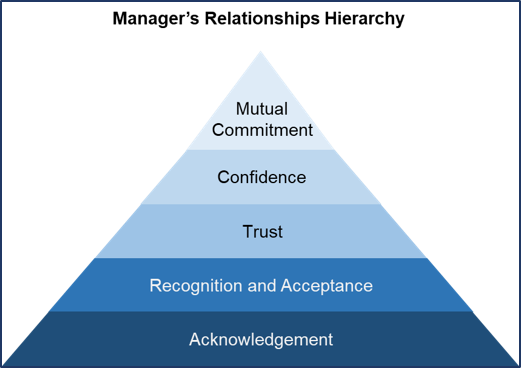A Facilitative Manager and Covid19
By Oliver W. Cummings
29/04/2020
Bill asked a question in the previous post on the facilitative manager and trust. In essence the question was, “In relation to the pandemic, is trust ‘flipped’ in that we need the workers to trust us more than we need to trust them?” It is an important question.
In the first of this series on the facilitative manager I introduced the manager’s relationship hierarchy. It looks like this:

As you demonstrate competence (for example, in technical, business and interpersonal skills), the relationship moves up the hierarchy to recognition and acceptance. A more solid relationship in getting the job done.
Trust, is a complex and critical pivot-point in building the relationship; it is based on the perception of your integrity. Competence is a prerequisite, but integrity allows others to believe that you will act consistently and fairly in any situation.
Confidence, results from your fair use and exercise of power and judgment. An employee may trust you personally, but not have confidence in your ability to employ power and judgment in your job. You may be perceived to be trustworthy, but ineffective on behalf of the employee in a given circumstance, like, for example, when the business is adversely affected in a pandemic.
At the highest level of the pyramid, mutual commitment, you and your employee have shared goals that address both business and individual needs. Each of you, in a sense, has the other’s back.
A circumstance like the closing of businesses and resulting dramatic changes to business models that may result from the effects of Covid19, can damage or destroy interpersonal relationships that have been developed to the confidence or mutual commitment levels.
If the circumstances allow the managers to handle the situation well, by keeping some level of stability for the employees and making sure that the phrases, “We’re all in this together,” and “We’ll get through this together,” have genuine and transparent meaning, such relationships may survive at the trust level and that makes for a foundation to build on when the business returns to whatever its new normal will be.
Handled poorly, however, (for example, by ignoring reasonable safety practices in the management decisions surrounding doing business during the disruptions caused by the pandemic or in the restart of operations as restrictions are lifted), trust will be perceived to have been betrayed, and at a minimum, recognition of mangers’ competence will be damaged. Such management missteps, even in (maybe especially in) dire circumstances, make it necessary for managers at all levels to restart their relationship building almost from the bottom up with their former or existing employees, as well as with potential new hires.
Bill’s question was, “Is trust ‘flipped’ in that we need the workers to trust us more than we need to trust them?” I go back to my basic premise that personal trust is a two-way street, grown out of shared experiences. The circumstances of the experiences certainly modify the way trust is developed and maintained. And, yes, managers need to be trust worthy in their exercise of management decisions in the emergency.
For trust to be preserved in the manager—employee relationship, however, the manager must also understand and accept the employee’s perception of what is a fair in the circumstance. So, even if the manager is unable to act in accord with the employee’s definition of fair, s/he must accept that it is the employee’s perception, and trust that it is genuinely motivated.
Never miss out!
Get an email update every time I publish new content. Be the first to know!
